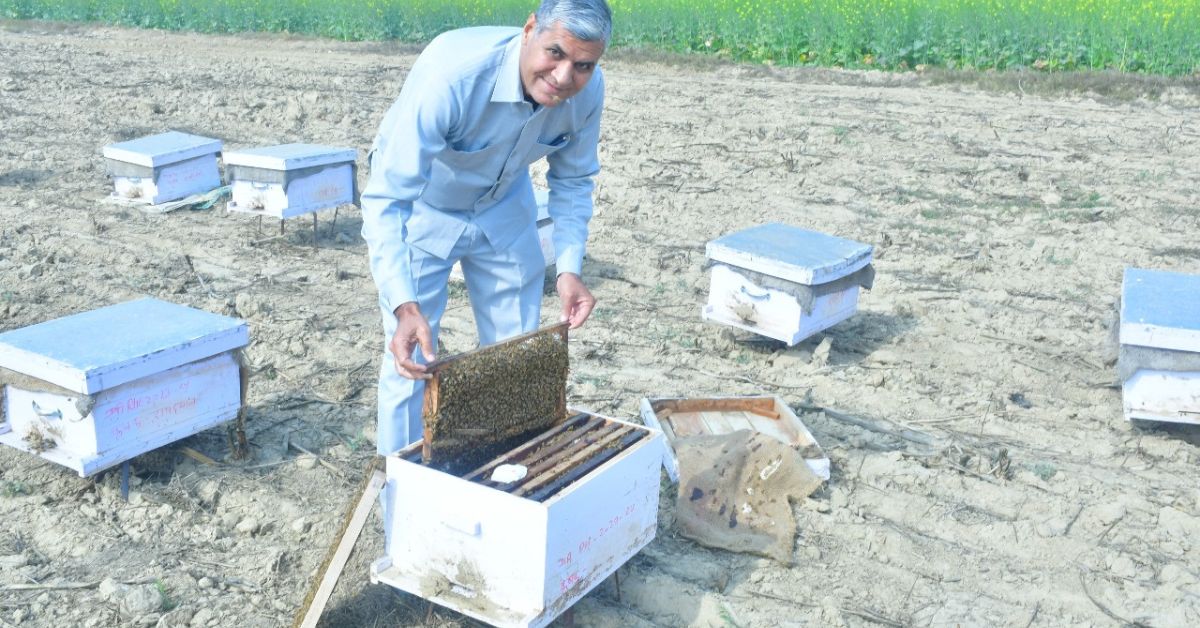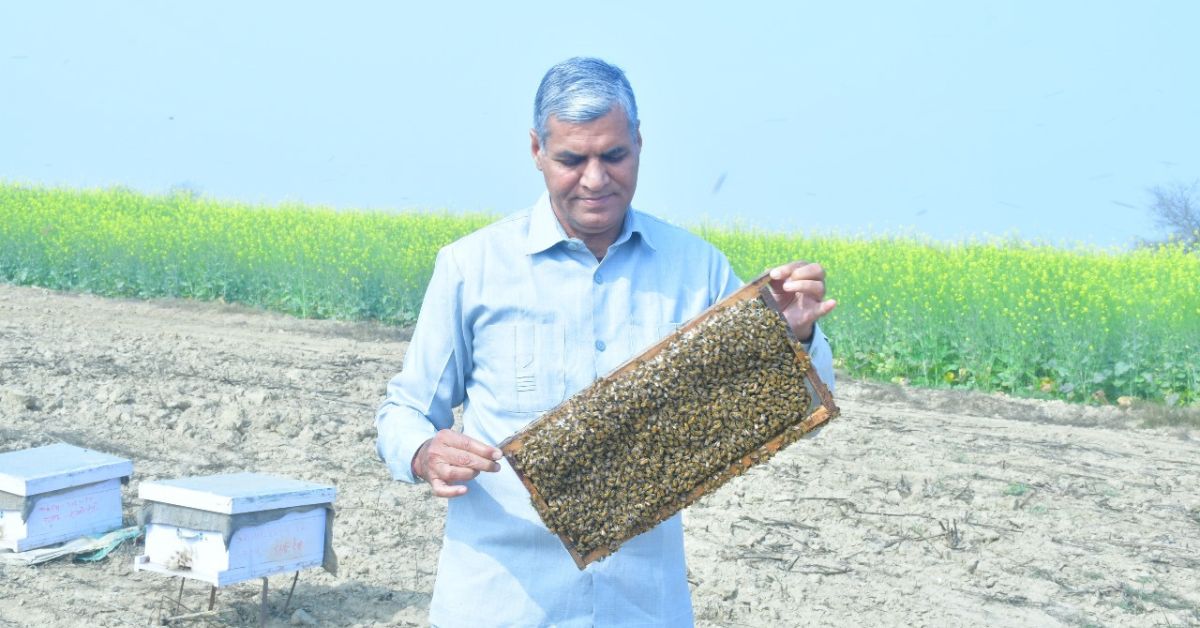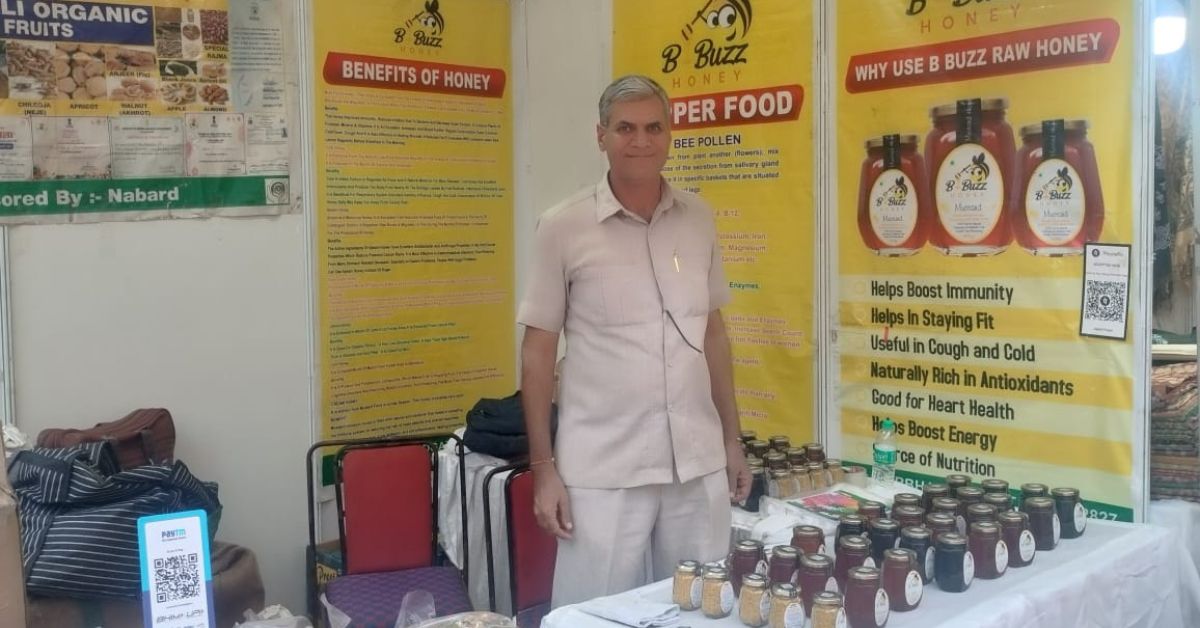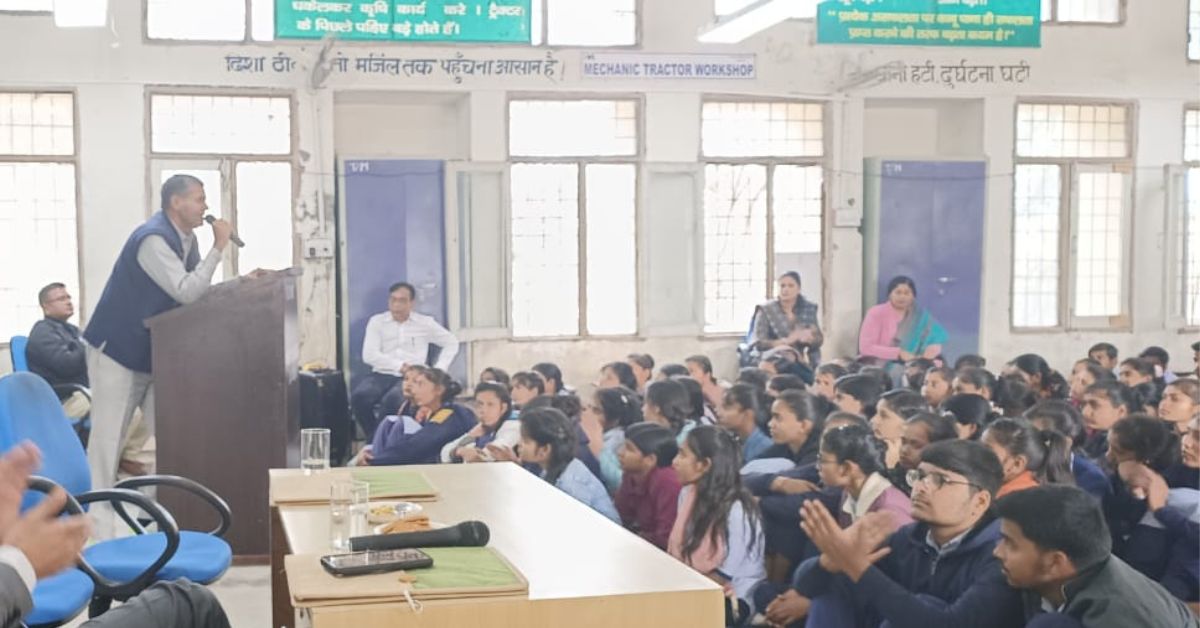Farmers gathered around Jagpal Singh Phogat’s farm in Haryana’s Jhajjar district, intrigued by the sight of bee boxes placed across his wheat fields. A teacher by profession, Jagpal deftly handled the buzzing boxes, drawing laughter from the onlookers — including his own father.
“My family opposed my decision to start beekeeping, especially my bapu (father). He sarcastically said, ‘Arey master, gaay paal le, bhains paal le, bakri paal le, murgi paal le, makkhi ke pali? Ud javegi. (You could have opted for cow rearing or buffaloes, poultry, or goat farming, why did you choose to raise bees? They will fly away),” shares Jagpal as he recalls his father’s comment.
In 2001, beekeeping was an unfamiliar concept in their village. While many dismissed Jagpal as crazy, their views quickly changed when they witnessed the remarkable results.
“Within a month, I managed to fill at least 25 large tin containers with honey,” recalls Jagpal. “Until then, we had only seen honey in small bottles. Even my father was astonished and asked how much it could sell for. I told him each container was worth Rs 2,000. That was more than we could earn from six months of hard work on the wheat farm. Surprised, he said, ‘Why didn’t you start this sooner?’”

Coming from an agricultural background, where earning Rs 50,000 per acre from wheat farming was a challenge, Jagpal realised that beekeeping offered far greater advantages over traditional farming methods.
“Beekeeping requires a one-time investment and provides yields year after year, unlike farming, where you have to re-sow for every season,” Jagpal (59) tells The Better India. “That’s a big difference. Plus, any small farmer can start beekeeping, even without much land.”
We sat down with Jagpal to learn more about the advantages of beekeeping, its impact on local farmers, and the potential for wider adoption of this eco-friendly practice.
From classroom to apiary
Jagpal began his career as an English teacher at a private secondary school. However, a chance encounter with beekeeping through a relative sparked a newfound passion. This wasn’t just a career change; it marked a transformative shift in his perspective on farming and community development.
Beekeeping, as Jagpal discovered, offers several advantages over conventional farming practices. “Firstly, it’s an eco-friendly approach,” he says. “Bees play a crucial role in pollination, which is a vital component of agriculture. Introducing beehives into a farm boosts pollination rates, leading to higher yields for farmers in a radius of up to two kilometres.”

This localised pollination benefit is particularly significant in water-scarce regions where optimising crop yields is paramount. “And the most important aspect is that beekeeping does not require any recurring expenses. With just one time investment, anyone can reap benefits year after year,” he explains.
In 2001, Jagpal began meeting bee farmers in Ludhiana, Punjab, to learn more about beekeeping. He purchased 30 bee boxes from a farmer in Delhi, investing Rs 60,000 — at Rs 2,000 per box. Without any formal training, he relied on learning from other farmers and his own hands-on experience.
His first encounter with bees, however, was far from pleasant. “While removing a hive frame, bees stung me in the eyes, leaving them badly swollen,” he recalls. “It happened because I didn’t understand bee behaviour at the time. But my passion kept me going. Instead of being scared, I chose to learn more about how bees behave.”
He adds, “When removing the frame from the box, it’s important to do it gently to avoid shocking the bees. Also, avoid wearing perfumes, aromatic hair oils, or black clothing, as these can irritate them.”
While continuing his teaching job, Jagpal began practising beekeeping on the side. After mastering the nuances of the trade, he decided to quit teaching in 2007 to devote himself fully to beekeeping.
Empowering over 500 fellow farmers
Jagpal raises the Apis mellifera variety of honey bees. “This variety offers high production and boosts pollination. During the flowering season, honey can be harvested within just 10 days. On average, I get around 40 kg of honey per box annually,” he informs.

The farmer also travels to various states — including Jammu and Kashmir, Uttarakhand, Rajasthan, and Haryana — to access the diverse floral sources in these regions. By introducing his bees to forests of neem, litchi, sesame, eucalyptus, apples, and mustard, he is able to produce a wide variety of high-quality honey.
Beekeeping isn’t just about honey production for Jagpal.
In 2016, he established his own processing unit and gradually began producing byproducts like beeswax, soap, bee pollen, and royal jelly. By showcasing his products at offline exhibitions, he was able to create a pan-India market — primarily in major metropolitan areas like Bengaluru, Delhi NCR, Mumbai, and Hyderabad.
“My son has also joined me in the business,” adds Jagpal. “He created an online presence for our products.” He sells his products under two brands — ‘Nature Fresh’ and ‘Bee Buzz’. Last year, Jagpal achieved an annual turnover of Rs 2 crore.
He says, “Any farmer can start beekeeping and earn handsome profits. It requires a one-time investment and you’d be able to recover the investment within a year.”

At 59, Jagpal actively shares his knowledge and experience with other farmers, demonstrating the practical application of beekeeping techniques. By mentoring and guiding others, he ensures that the benefits of beekeeping are accessible and sustainable in the long term.
So far, he has trained at least 500 farmers in beekeeping. One such farmer is Dharmaveer Singh Nandal from Mehrana village in Jhajjar district. With Jagpal’s guidance, Dharmaveer learned about beekeeping and soon set up his own business in 2003.
“I started with 30 bee boxes, and now I have 2,500,” says Dharmaveer Singh Nandal from Mehrana village. “Initially, I was a bit sceptical and scared about handling honey bees. But Jagpal ji helped me understand the nature of bees and the advantages of beekeeping. Compared to farming wheat, paddy, and mustard, it’s very beneficial. Today, I earn between Rs 5 to 10 lakh a year.”
It’s been 25 years since Jagpal started in the honey business. Reflecting on his decision, he says, “There was a time when villagers called me ‘bawla’ (crazy) and visited my farm just to mock me. But those same people eventually took up beekeeping themselves. I’m glad I was able to introduce them to the benefits of beekeeping, and I continue to do so.”
Edited by Pranita Bhat; All images courtesy Jagpal Singh Phogat

No comments:
Post a Comment